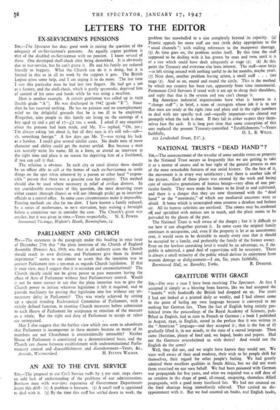LETTERS TO THE EDITOR EX-SERVICEMEN'S PENSIONS
Sia,—The Spectator has done good work in raising the question of the adequacy of ex-Servicemen's pensions. An equally urgent problem is that of the disabled ex-Serviceman with no pension. I know several of these. One developed shell-shock after being demobbed. It is obviously due to war-service, but he can't prove it. He and his family are reduced literally to beggary. What the Church can do it is doing, but it is limited in this as in all its work by the support it gets. The British Legion gives some help, and I am urging it to do more. The last time I saw this particular man he had lost two fingers. He had got a job at a factory, and the shell-shock, which is partly spasmodic, deprived him of control of his arms and hands while he was using a machine.
Here is another example. A certain gentleman was called up in 5939 (health grade "A "). He was discharged in 1942 (grade "E "). Since then he has received nothing. He has no pension and no unemployment relief on the delightful grounds that he is too ill to be employed. Altogether, nine people in this family are living on the earnings of a boy aged 15 and a girl of 17—£2 los. a week. I asked if any enquiries about the pension had been made, and Mr. T— replied, "Oh, yes ; ' I'm always asking 'em about it, but all they says is it's still sub—sub- oh, something foreign." A few days ago Mr. T—was trying his luck as a hawker. I could give several similar cases. No doubt men of more character and ability could get the matter settled. But because a man can scarcelr write his name, fill in a form, or attend an interview at the right time and place is no reason for depriving him of a livelihood, if you can call it that.
The solution is obvious. In each city or rural 'district there should be an officer able to call at the homes of such ex-Servicemen to settle things on the spot when informed by a parson or other local " respon- sible " person that there was a genuine case for enquiry. This method should also be used where necessary in relief of civilian distress. In my considerable experience of this question, the most deserving cases either cannot (through illness) or will not (through pride) go to interview officials at a central office. In some cases circumstances make it impossible. Existing methods are also far too slow. I have known a family reduced, by a series of misfortunes, to nen- starvation, kept waiting a fortnight before a committee met to consider the case. The Church's grant was


































 Previous page
Previous page